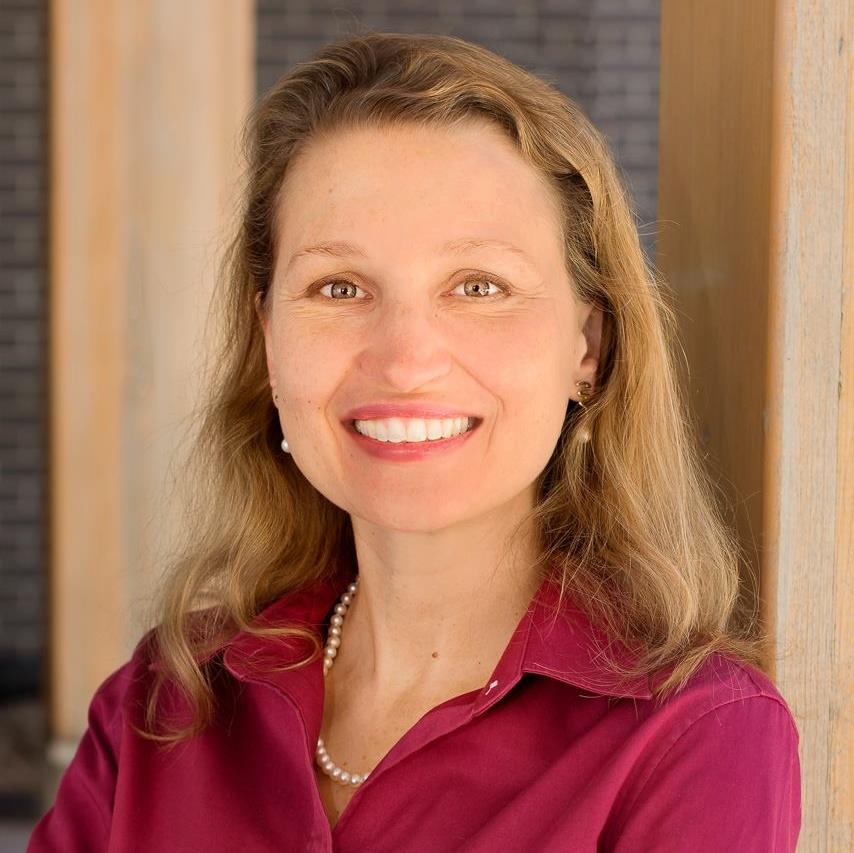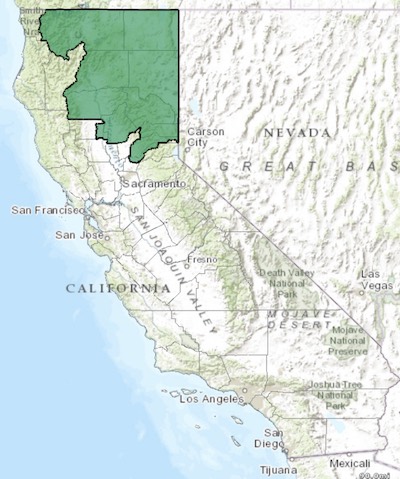On November 9th, I visited and spoke with Jessica Holcombe, who is running for Congress in California’s first district. A transcript of our conversation is below.
If after reading this interview you agree with me that Jessica Holcombe is the right candidate for the first district, please join me in donating generously to her campaign!
—Maciej Ceglowski
An Interview With Jessica Holcombe, Candidate For Congress in CA-01

Can you describe your district to people who don't know this part of California?
In terms of landmass, our district is one of the largest in California, ranging from northern Auburn where we live, including a portion of Nevada County and the lake district north of Lake Tahoe. Our district then stretches east along the Nevada border, north to the Oregon border, and nearly reaches our coast. Our district includes eleven counties, some of which are sparsely populated.

When you drive through the district from Auburn and Grass Valley to Redding you’ll pass orchards, rolling hills and farm country. Traveling east takes you through forests, picturesque ranches, the Sierras and Lassen National Park, a stunningly beautiful region of the country. We also border the Cascade-Siskiyou National Monument.
I spent part of my childhood in Santa Cruz and the “old” District 1 which included Sonoma County. I was working for a law firm in Silicon Valley, when my husband, Vincent, and I decided to move to Auburn in 2011, close to my aunt and uncle’s home. We fell in love with the beauty of the area, the rolling hills, and quiet pace of life.
Although Auburn is less than 2.5 hours away from San Francisco, a stark prosperity divide exists between our rural district and the Bay Area. We have higher unemployment, a lack of medical services, a flight of younger workers to urban areas, and a median household income below $50,000 per year. Even in popular tourist areas such as Lassen National Park, the neighboring towns are lined with hauntingly deserted and boarded-up roadside motels and few restaurants or shops.
Reliable access to broadband is not readily available in many of our counties which is a major hurdle to economic development. As a result, businesses won’t open their doors without broadband and consequently residents are limited to job opportunities which don’t require internet access and which are meager compared to the Bay Area and Sacramento.
You're originally from Santa Cruz. What made you choose to live in this part of California?
My aunt and uncle live in Grass Valley, and I received my JD and MBA from UC Davis, which is in the vicinity of Sacramento. I’ve always really loved this area. The foothills are much less congested than the Bay Area and housing is significantly more affordable than Silicon Valley.
Vincent is originally from a rural village in The Netherlands, and he always felt more at home at my aunt and uncle’s than the Bay Area. Although I initially continued commuting to my job in Silicon Valley before starting my law practice here, we decided to make Auburn our permanent home.
A lot of us know your district because of the Oroville Dam, which nearly collapsed this February. Can you tell us about that near-disaster?
The aging infrastructure of the dam was in disrepair. In 2005, three environmental groups filed a motion to urge federal regulatory agencies to require state officials to reinforce the emergency spillway to avoid what happened in 2017. However, no one wanted to pay for it, and certain federal officials believed nothing was wrong. Doug LaMalfa apparently ridiculed the State Dept. of Water Resources in Oroville and the Bureau of Reclamation (Shasta) for creating too much flood control space in the back of both dams because he wanted to keep more water within the reservoir with smaller spillways which would lead to potentially greater flooding and more pressure on the dam. Prior to 2017, most of the farming communities were more concerned about drought conditions, not what would happen if we had too much rain.
I understand your district was also badly affected by fires this year?
At the same time of the disastrous Napa and Sonoma fires, the Lobo fire in Grass Valley destroyed over 880 acres and several homes. We see major fires in this district almost every year which are more frequently caused by people rather than natural causes such as lightening. Our fires have started because of runaway camping or intentional brush fires, sparks from lawn mowers, and arson. Dry conditions combined with winds in September and October increase the probability of major fires.
We need federal funding for improved forest management. Doug LaMalfa advocates for timber production and even the privatization of portions of our national monument, Cascade-Siskiyou. Depriving us of one of our richly biodiverse national monuments in favor of special interest groups is not forest management. The goal is not to sell our national treasures, as LaMalfa proposes, but secure funding for forest fire management by providing firebreaks and disposing of the millions of dead trees ravaged by drought and by bark beetles. The dead trees can be recycled in biomass plants for renewable energy.
Doug LaMalfa makes excuses for his failure to improve the economic conditions of our district, claiming regulations hold back ag, timber and mining jobs. He not only wishes to privatize portions of our national monument, but he has voted to cut funding for the EPA by over $200 million. He complains that urban Californians consider our district their “park,” and he told a journalist from the New York Times, “You have idealists from the cities who say, ‘Wouldn’t it be great to reintroduce wolves to rural California?’” To which LaMalfa responded, “Let’s introduce some wolves into Golden Gate Park and the Santa Monica Pier.” Of course our goal should be to protect our environmental treasures for future generations, not to defund their protection as LaMalfa proposes. From an economic standpoint, our competitive advantage is not timber or mining, but technology, including agtech, and tourism. In 2016, Lassen National Park alone attracted over a half million visitors to Lassen National Park.
LaMalfa has demonstrated that he would rather play partisan politics than obtain federal funds for forest management or relief for the victims of the recent fire disasters in our region. Governor Brown circulated a letter among the Republican congressional representative in California to seek their support in obtaining over $7 billion in disaster funding for NorCal fire victims. LaMalfa refused to sign that letter, because Governor Brown is a Democrat, and LaMalfa’s a Republican.
You're a first-time candidate for Congress. What was the moment you decided, I can't take this, I have to run?
I woke up several times in shock the night Trump got elected. I feared for the fate of our country, for our civil rights, for our security, and for our diplomatic efforts. What would become of our country with someone like Trump, inexperienced, and with such racist, violent and inflammatory rhetoric? Along the campaign trail, he hadn’t even demonstrated the emotional stability necessary to preside over our country.
LaMalfa’s voting record indicated he was an arch conservative politician who parroted his party’s policies and the desires of his largest corporate donors. I began paying close attention to his statements and whether or not he was listening to the concerns expressed during his town hall meetings on healthcare, immigration, climate change, and funding public education. Despite the vast majority of attendees at his townhall meetings decrying his vote to repeal the Affordable Care Act, his support of Trump’s wall and travel ban, and LaMalfa’s denial of human-caused climate change, it became clear that LaMalfa didn’t care about the concerns of his constituents. When one young woman asked him how he would defend her rights as a member of the LGBTQ community, his response began with, “Scripture says…” It was clear he would stand behind his party and support Trump, regardless of the consequences. When LaMalfa was asked about the KKK and neo-Nazi marches in Charlottesville which resulted in the murder of a young activist, Heather Heyer, LaMalfa responded, “…this is a heyday for the left.” In terms of our civil rights, it’s as if LaMalfa wants to return us not just to a pre-Obama era but a pre-Civil Rights era.
After Trump’s election, I joined a local Indivisible group, and we met with LaMalfa’s staff and attended town hall meetings. The group concluded, "LaMalfa doesn’t listen to us; we need to find candidates to run against him." Someone in our group then said, "I nominate Jessica," and a couple of other members of the group said "Yeah, Jessica could do this."
So you were drafted!
Yes! I said, "if you want me to do this, instead of holding up a sign at our next demonstration, if you want me to run, I'll do it,” and we launched the campaign in May.
When I talk to people who have run for office, or hold local offices, and they ask what drives me forward (because running in this district is certainly not easy), watching LaMalfa defend Trump on every one of his policies no matter how destructive, there's a fire in me that can't be put out. I will not let LaMalfa undermine our civil rights, take away swaths of our national monuments for private interests, reverse the progress of renewable energy, deprive millions of healthcare, and continue to lazily blame regulations for our lack of prosperity while he and his family continue to take federal subsidies, our tax dollars, for his rice farm. The thought of his continued damage to our country is what drives me forward.
This district is challenging. On the Cook scale it's R+9, and there's an 18% predominance of Republicans over Democrats. Given those realities, what's your plan for defeating LaMalfa?
LaMalfa is not popular, even among a lot of Republicans. While a number of Republicans who will vote for him simply because he's a member of their party, many farmers and ranchers resent him because he receives federal subsidies while they don’t. In addition, he's not charismatic or energetic, he's not well-known for passing legislation that benefits our district.
People are hungry for progressive change, and members of our district are looking for someone who can implement policies that benefit them, their families and their communities regardless of party affiliation. As a candidate, it's not about saying "He's a Republican, I'm a Democrat, and therefore we're polar opposites, vote for me." Instead, my conversation with those in our district has been: "I understand you're concerned about losing your health care, and insurance costs becoming too expensive for your family to afford. Let's talk about solutions. What about lowering the age of Medicare? What about making sure that those families that couldn't otherwise afford health insurance can continue to obtain subsidies, so they can afford the care they need? What about a system where the government can negotiate the price we're paying for our health care? You still get the same health care, it's still private, it's just like what you experience in Medicare, where you have your choice of doctor. But, you've got more federal funding for the care that you're getting, and you've got the negotiating power of the federal government behind you.”
Jobs are another major concern in our district.
Our competitive advantage, given our proximity to Sacramento and the Bay Area, is technology and agtech. We have a four-year university in the district, Chico State. However, many graduates leave the district to work in Sacramento and the Bay Area. If we provided entrepreneurs in the area with grants, we could have startup competitions, where the winner would receive $40-50,000 in federal grant funding to open their doors for business in the district.
We could provide co-working spaces to keep entrepreneurs here which has a ripple effect of attracting larger companies because the talent is already here.
Taking such proactive steps is necessary to improve the economic prospects of this district.
I understand that this used to be the case. Redding was a technology hub, and had a dynamic similar to Silicon Valley. The city has that history, and it could happen there again.
Yes, definitely. Also, having Chico State close by is an advantage. But we’ve got to give graduates a reason to stay.
Broadband is really a necessary utility for entrepreneurs, which is just as important as electricity, or a telephone line.
LaMalfa pays lip service to the problem, but he's more focused on legislation that his party touts or his donors want. It is easier for LaMalfa to engage in distraction tactics and fearmongering, to stoke fears of undocumented immigrants or Muslim Americans rather than improving our communities or access to healthcare. Of course, his constituents are much more likely to die from a lack of healthcare than a chance encounter with a gang member from South of the Border.
A lot of Bay Area techies know your district because we drive through it on the way to Tahoe. What can tech workers outside your district do to help your campaign?
We have many volunteers who are ready to fight for our district. Since we launched the campaign in May, we've had over 200 people sign up who are interested in being involved in some way. We have been able to find volunteers to make phone calls to get the word out, to walk the precincts, write letters to the editor, or host coffee meet-and greets.
The major challenge in this district has been fundraising, and the fact that this district is largely ignored by the Democratic party, since it's not considered a swing district.
The candidates who have run against LaMalfa during the past three elections have been drastically underfunded compared to other Democratic candidates in swing districts. If we even had a fraction of the funding we've seen in some of the special elections, in Georgia, or in swing districts in California, this funding could make all the difference in flipping this district.
The number one thing we need in this district is money: to hire campaign managers and field managers to manage hundreds of volunteers. Otherwise our message is only heard within small groups among ourselves, among like-minded individuals, and we do not reach the 700,000+ people in our district.
What are the key issues that you'll be fighting for on your first day in office?
The main issue is going to be health care. We need to move in the direction of a single payer system: Medicare for all.
We're the only developed country in the world that doesn't provide national health care to its citizens. Those who oppose universal healthcare think it's a form of public sector health care administered by the government. That's not it at all—it's the same private health care that we've received all along without the interference of private insurance companies. Effectively we’re decreasing the age limit for Medicare to make healthcare more readily available to all Americans.
You mentioned the Oroville dam before, and I had attended LaMalfa’s town hall in Oroville shortly after the spillway disaster. Most of the attendees did not want to talk about the dam but the loss of their healthcare! This is a pivotal issue which effects everyone in our district, particularly recipients of Medicaid and Medicare.
Thank you so much for talking to me!

Please share this interview with others, and take a moment to donate to Jessica's campaign! The money you donate now will go directly into grassroots work including staffing, field offices, outreach, and canvassing. We can help Jessica flip her district in 2018 if we give her adequate resources in 2017.
If you can afford it, please consider giving the maximum donation of $2,700. But any amount you can give will make a difference. Whatever the Democratic Party thinks, this is a district we should be fighting hard in!